高三英语阅读理解
- 格式:docx
- 大小:21.13 KB
- 文档页数:5
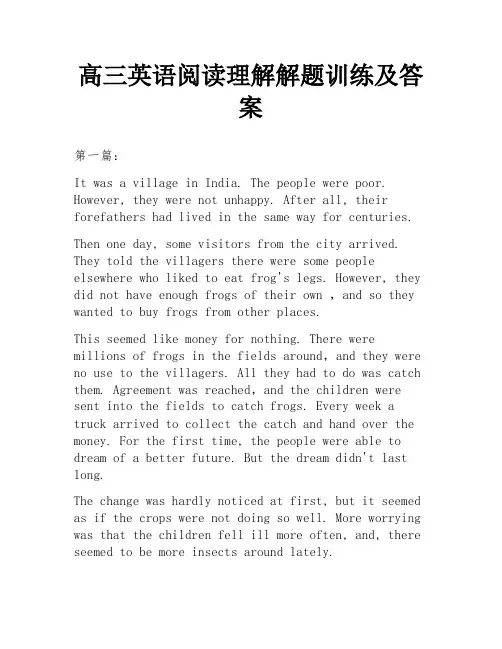
高三英语阅读理解解题训练及答案第一篇:It was a village in India. The people were poor. However, they were not unhappy. After all, their forefathers had lived in the same way for centuries.Then one day, some visitors from the city arrived. They told the villagers there were some people elsewhere who liked to eat frog's legs. However, they did not have enough frogs of their own ,and so they wanted to buy frogs from other places.This seemed like money for nothing. There were millions of frogs in the fields around,and they were no use to the villagers. All they had to do was catch them. Agreement was reached,and the children were sent into the fields to catch frogs. Every week a truck arrived to collect the catch and hand over the money. For the first time, the people were able to dream of a better future. But the dream didn't last long.The change was hardly noticed at first, but it seemed as if the crops were not doing so well. More worrying was that the children fell ill more often, and, there seemed to be more insects around lately.The villagers decided that they couldn't just wait to see the crops failing and the children getting weak. They would have to use the money earned to buy pesticides (杀虫剂) and medicines. Soon there was no money left.Then the people realized what was happening. It was the frog. They hadn't been useless. They had been doing an important job—eating insects. Now with so many frogs killed, the insects were increasing more rapidly. They were damaging the crops and spreading diseases.Now,the people are still poor. But in the evenings they sit in the village square and listen to sounds of insects and frogs. These sounds of the night now have a much deeper meaning.1. From Paragraph 1,we learn that thevillagers________.A. worked very hard for centuriesB. dreamed of having a better lifeC. were poor but somewhat contentD. lived a different life from their forefathers2. Why did the villagers agree to sell frogs?A. The frogs were easy money.B. They needed money to buy medicine.C. They wanted to please the visitors.D. The frogs made too much noise.3. What might be the cause of the children's sickness?A. The crops didn't do well.B. There were too many insects.C. The visitors brought in diseases.D. The pesticides were overused.4. What can we infer from the last sentence of the text?A. Happiness es from peaceful life in the country.B. Health is more important than money.C. The harmony between man and nature is important.D. Good old days will never be forgotten.第二篇:Somali pirates (海盗) robbed three Thai fishing ships with 77 sailors on board nearly 1,200 miles off the Somali coast, the farthest-off-shore attack to date, an officer said Tuesday.Pirates have gone farther south and east in answer to increased patrols(巡逻) by warships off the Somali shore. The robbing of the three ships Sunday was about 600 miles outside the normal operation area for the international force, said a spokesman.The spokesman said the attack so far out at sea was a clear sign that the international patrols against pirates were having a “marked effect on pirateactivity in the area”.“Once they start attacking that far out, you're not even really talking about the Somali basin or areas of water that have any connection with Somalia.” said an officer, Roger Middleton. “Once you're that far out, it's just the Indian Ocean,and it means you're looking at trade going from the Gulf to Asia, from Asia to South Africa.”“This is the farthest robb ing to date. They are now operating near the Maldives and India.” said another officer.The three ships-the MV Prantalay 11,12,and 14-had 77 members on board in total. All of them are Thai, the spokesman said. Before the Sunday robbing, pirates held 11 ships and 228 sailors.Pirates have increased attacks over the past year in hopes of catching more dollar payments. Because of increased patrols and defenses on board ships, the success rate(率) has gone down, though the number of successful attacks has stayed the same year over year.1. The pirate attack reported in the texthappened________.A. far out in the Indian OceanB. in the normal patrol areaC. near the Somali coastD. in the south of Africa2. According to the text, which can best describe the situation of the pirate problems?A. More goods on board are lost.B. Pirate attacks happen in a larger area now.C. The number of attacks has stayed the same these years.D. Pirate attacks are as serious as before along the Somali coast.3. Which is TRUE about the warship patrols according to the text?A. The patrols are of little effect.B. The patrols are more difficult.C. More patrols are quite necessary even in Asia.D. The patrols only drive the pirates to other areas.4. How many sailors were held by the pirates up to the time of the report?A. 228.B. 77.C. 383.D. 305.第一篇:本篇文章为记叙文。
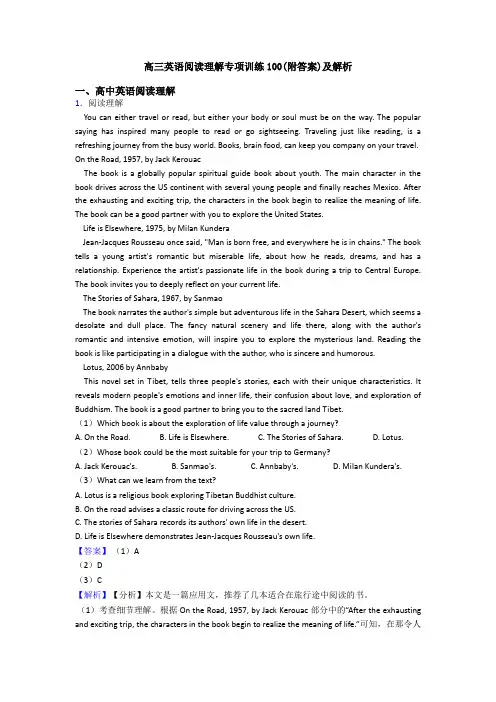
高三英语阅读理解专项训练100(附答案)及解析一、高中英语阅读理解1.阅读理解You can either travel or read, but either your body or soul must be on the way. The popular saying has inspired many people to read or go sightseeing. Traveling just like reading, is a refreshing journey from the busy world. Books, brain food, can keep you company on your travel. On the Road, 1957, by Jack KerouacThe book is a globally popular spiritual guide book about youth. The main character in the book drives across the US continent with several young people and finally reaches Mexico. After the exhausting and exciting trip, the characters in the book begin to realize the meaning of life. The book can be a good partner with you to explore the United States.Life is Elsewhere, 1975, by Milan KunderaJean-Jacques Rousseau once said, "Man is born free, and everywhere he is in chains." The book tells a young artist's romantic but miserable life, about how he reads, dreams, and has a relationship. Experience the artist's passionate life in the book during a trip to Central Europe. The book invites you to deeply reflect on your current life.The Stories of Sahara, 1967, by SanmaoThe book narrates the author's simple but adventurous life in the Sahara Desert, which seems a desolate and dull place. The fancy natural scenery and life there, along with the author's romantic and intensive emotion, will inspire you to explore the mysterious land. Reading the book is like participating in a dialogue with the author, who is sincere and humorous.Lotus, 2006 by AnnbabyThis novel set in Tibet, tells three people's stories, each with their unique characteristics. It reveals modern people's emotions and inner life, their confusion about love, and exploration of Buddhism. The book is a good partner to bring you to the sacred land Tibet.(1)Which book is about the exploration of life value through a journey?A. On the Road.B. Life is Elsewhere.C. The Stories of Sahara.D. Lotus.(2)Whose book could be the most suitable for your trip to Germany?A. Jack Kerouac's.B. Sanmao's.C. Annbaby's.D. Milan Kundera's.(3)What can we learn from the text?A. Lotus is a religious book exploring Tibetan Buddhist culture.B. On the road advises a classic route for driving across the US.C. The stories of Sahara records its authors' own life in the desert.D. Life is Elsewhere demonstrates Jean-Jacques Rousseau's own life.【答案】(1)A(2)D(3)C【解析】【分析】本文是一篇应用文,推荐了几本适合在旅行途中阅读的书。
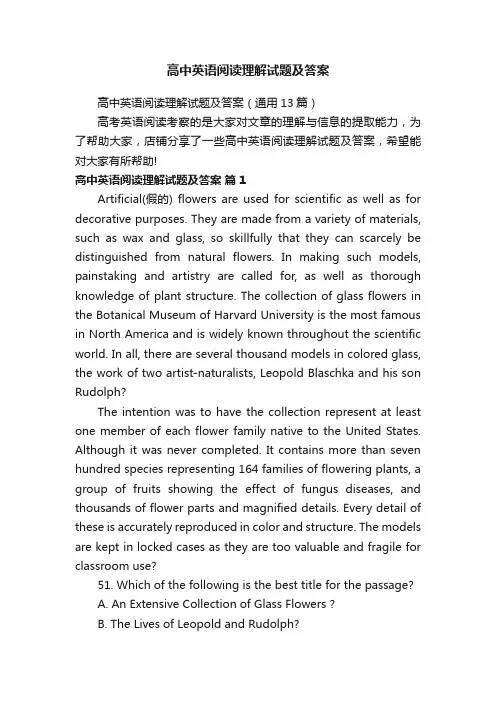
高中英语阅读理解试题及答案高中英语阅读理解试题及答案(通用13篇)高考英语阅读考察的是大家对文章的理解与信息的提取能力,为了帮助大家,店铺分享了一些高中英语阅读理解试题及答案,希望能对大家有所帮助!高中英语阅读理解试题及答案篇1Artificial(假的) flowers are used for scientific as well as for decorative purposes. They are made from a variety of materials, such as wax and glass, so skillfully that they can scarcely be distinguished from natural flowers. In making such models, painstaking and artistry are called for, as well as thorough knowledge of plant structure. The collection of glass flowers in the Botanical Museum of Harvard University is the most famous in North America and is widely known throughout the scientific world. In all, there are several thousand models in colored glass, the work of two artist-naturalists, Leopold Blaschka and his son Rudolph?The intention was to have the collection represent at least one member of each flower family native to the United States. Although it was never completed. It contains more than seven hundred species representing 164 families of flowering plants, a group of fruits showing the effect of fungus diseases, and thousands of flower parts and magnified details. Every detail of these is accurately reproduced in color and structure. The models are kept in locked cases as they are too valuable and fragile for classroom use?51. Which of the following is the best title for the passage?A. An Extensive Collection of Glass Flowers ?B. The Lives of Leopold and Rudolph?C. Flowers Native to the United States?D. Material Used for Artificial Flowers?52. It can be inferred from the passage that the goal of Leopold and Rudolph was to ______________?A. create a botanical garden where only exotic flowers grew?B. do a thorough study of plant structure?C. make a copy of one member of each United States flower family?D. show that glass are more realistic than wax flowers?53.The underlined word “it” refers to ______________?A. the intentionB. the collectionC. one memberD. each flower family?54. Which of the following is NOT included in the display at the Botanical Museum of Harvard University?A. Models of 164 families of flowering plants?B. Magnified details of flower parts?C. Several species of native birds?D. A group of diseased fruits?55. Which of the following statements is true of the flowers at Harvard University?A. They form a completed collection?B. They have a marvelous fragrance?C. They are loaned to schools for classroom use?D. They use authentic representations.【答案与解析】 51—55 ACBCD51.A.细节理解题。
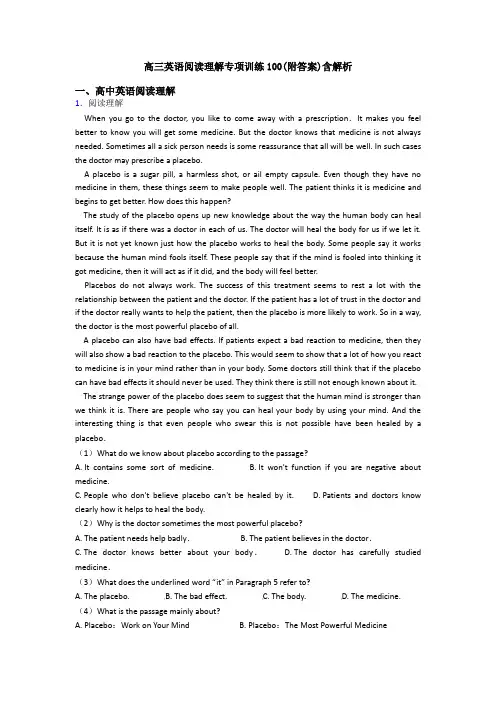
高三英语阅读理解专项训练100(附答案)含解析一、高中英语阅读理解1.阅读理解When you go to the doctor, you like to come away with a prescription.It makes you feel better to know you will get some medicine. But the doctor knows that medicine is not always needed. Sometimes all a sick person needs is some reassurance that all will be well. In such cases the doctor may prescribe a placebo.A placebo is a sugar pill, a harmless shot, or ail empty capsule. Even though they have no medicine in them, these things seem to make people well. The patient thinks it is medicine and begins to get better. How does this happen?The study of the placebo opens up new knowledge about the way the human body can heal itself. It is as if there was a doctor in each of us. The doctor will heal the body for us if we let it. But it is not yet known just how the placebo works to heal the body. Some people say it works because the human mind fools itself. These people say that if the mind is fooled into thinking it got medicine, then it will act as if it did, and the body will feel better.Placebos do not always work. The success of this treatment seems to rest a lot with the relationship between the patient and the doctor. If the patient has a lot of trust in the doctor and if the doctor really wants to help the patient, then the placebo is more likely to work. So in a way, the doctor is the most powerful placebo of all.A placebo can also have bad effects. If patients expect a bad reaction to medicine, then they will also show a bad reaction to the placebo. This would seem to show that a lot of how you react to medicine is in your mind rather than in your body. Some doctors still think that if the placebo can have bad effects it should never be used. They think there is still not enough known about it. The strange power of the placebo does seem to suggest that the human mind is stronger than we think it is. There are people who say you can heal your body by using your mind. And the interesting thing is that even people who swear this is not possible have been healed by a placebo.(1)What do we know about placebo according to the passage?A. It contains some sort of medicine.B. It won't function if you are negative about medicine.C. People who don't believe placebo can't be healed by it.D. Patients and doctors know clearly how it helps to heal the body.(2)Why is the doctor sometimes the most powerful placebo?A. The patient needs help badly.B. The patient believes in the doctor.C. The doctor knows better about your body.D. The doctor has carefully studied medicine.(3)What does the underlined word “it” in Paragraph 5 refer to?A. The placebo.B. The bad effect.C. The body.D. The medicine.(4)What is the passage mainly about?A. Placebo:Work on Your MindB. Placebo:The Most Powerful MedicineC. Placebo:The Best DoctorD. Placebo:Heal Your Body【答案】(1)A(2)B(3)B(4)A【解析】【分析】本文是一篇说明文,有时候病人的病并不是需要真正的药物来医治,而是需要医生开一些安慰的药剂,安慰病人的心理使病人的情绪得到舒缓,从而有利于病情的痊愈。
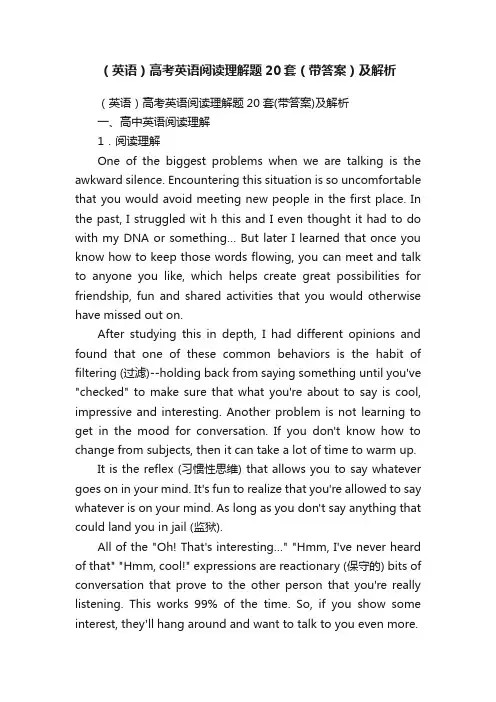
(英语)高考英语阅读理解题20套(带答案)及解析(英语)高考英语阅读理解题20套(带答案)及解析一、高中英语阅读理解1.阅读理解One of the biggest problems when we are talking is the awkward silence. Encountering this situation is so uncomfortable that you would avoid meeting new people in the first place. In the past, I struggled wit h this and I even thought it had to do with my DNA or something… But later I learned that once you know how to keep those words flowing, you can meet and talk to anyone you like, which helps create great possibilities for friendship, fun and shared activities that you would otherwise have missed out on.After studying this in depth, I had different opinions and found that one of these common behaviors is the habit of filtering (过滤)--holding back from saying something until you've "checked" to make sure that what you're about to say is cool, impressive and interesting. Another problem is not learning to get in the mood for conversation. If you don't know how to change from subjects, then it can take a lot of time to warm up.It is the reflex (习惯性思维) that allows you to say whatever goes on in your mind. It's fun to realize that you're allowed to say whatever is on your mind. As long as you don't say anything that could land you in jail (监狱).All of the "Oh! That's interesting…" "Hmm, I've never heard of that" "Hmm, cool!" expressions are reactionary (保守的) bits of conversation that prove to the other person that you're really listening. This works 99% of the time. So, if you show some interest, they'll hang around and want to talk to you even more.Everyone knows that stories juice-up conversations, but most people only talk about stories of their own lives. When someone mentions something related to any of them, just tell the story, even if it's not from your life. The more interesting, stranger or more frightening they are, the harder they are to forget.(1)If people can deal with the awkward silence, they can .A. train their working skillB. improve their life qualityC. enrich their social lifeD. establish their working relationship(2)When talking with others, we should .A. feel nervousB. think twiceC. be free to expressD. avoid breaking in (3)According to the passage, what do the speakers care much about?A. The attractive topics of conversation.B. The atmosphere of the conversation.C. The listener's experiences and tastes.D. The listener's curiosity and concern.(4)What does the underlined part "juice-up conversations" mean?A. making conversations more boringB. making conversations livelierC. making conversations smootherD. making conversations more relaxing【答案】(1)C(2)C(3)D(4)B【解析】【分析】本文本文是一篇议论文,我们谈话时最大的问题之一是尴尬的沉默。
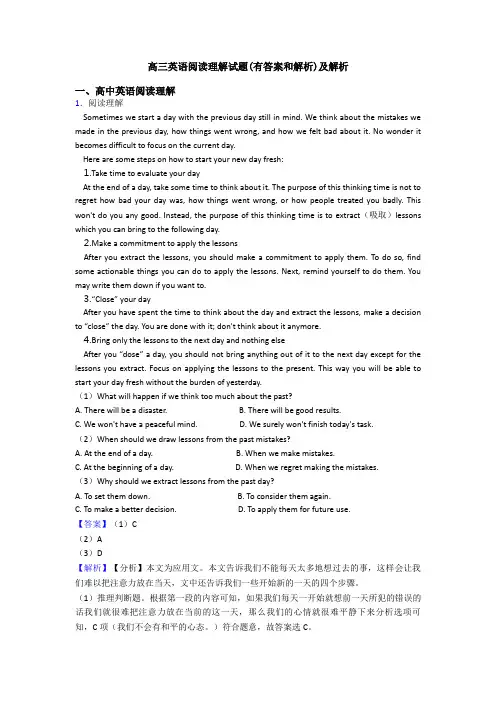
高三英语阅读理解试题(有答案和解析)及解析一、高中英语阅读理解1.阅读理解Sometimes we start a day with the previous day still in mind. We think about the mistakes we made in the previous day, how things went wrong, and how we felt bad about it. No wonder it becomes difficult to focus on the current day.Here are some steps on how to start your new day fresh:⒈Take time to evaluate your dayAt the end of a day, take some time to think about it. The purpose of this thinking time is not to regret how bad your day was, how things went wrong, or how people treated you badly. This won't do you any good. Instead, the purpose of this thinking time is to extract(吸取)lessons which you can bring to the following day.⒉Make a commitment to apply the lessonsAfter you extract the lessons, you should make a commitment to apply them. To do so, find some actionable things you can do to apply the lessons. Next, remind yourself to do them. You may write them down if you want to.⒊“Close” your dayAfter you have spent the time to think about the day and extract the lessons, make a decision to “close” the day. You are done with it; don't think about it anymore.⒋Bring only the lessons to the next day and nothing elseAfter you “dose” a day, you should not bring anything ou t of it to the next day except for the lessons you extract. Focus on applying the lessons to the present. This way you will be able to start your day fresh without the burden of yesterday.(1)What will happen if we think too much about the past?A. There will be a disaster.B. There will be good results.C. We won't have a peaceful mind.D. We surely won't finish today's task.(2)When should we draw lessons from the past mistakes?A. At the end of a day.B. When we make mistakes.C. At the beginning of a day.D. When we regret making the mistakes.(3)Why should we extract lessons from the past day?A. To set them down.B. To consider them again.C. To make a better decision.D. To apply them for future use.【答案】(1)C(2)A(3)D【解析】【分析】本文为应用文。
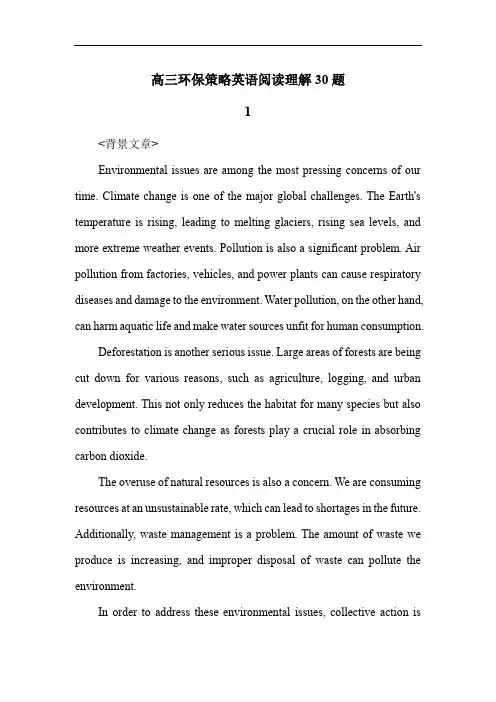
高三环保策略英语阅读理解30题1<背景文章>Environmental issues are among the most pressing concerns of our time. Climate change is one of the major global challenges. The Earth's temperature is rising, leading to melting glaciers, rising sea levels, and more extreme weather events. Pollution is also a significant problem. Air pollution from factories, vehicles, and power plants can cause respiratory diseases and damage to the environment. Water pollution, on the other hand, can harm aquatic life and make water sources unfit for human consumption.Deforestation is another serious issue. Large areas of forests are being cut down for various reasons, such as agriculture, logging, and urban development. This not only reduces the habitat for many species but also contributes to climate change as forests play a crucial role in absorbing carbon dioxide.The overuse of natural resources is also a concern. We are consuming resources at an unsustainable rate, which can lead to shortages in the future. Additionally, waste management is a problem. The amount of waste we produce is increasing, and improper disposal of waste can pollute the environment.In order to address these environmental issues, collective action isneeded. Governments, businesses, and individuals all have a role to play. Governments can implement policies to reduce emissions, protect forests, and promote sustainable development. Businesses can adopt environmentally friendly practices and invest in green technologies. Individuals can make small changes in their daily lives, such as reducing energy consumption, recycling, and using public transportation.1. What is one of the major global challenges mentioned in the passage?A. Deforestation.B. Pollution.C. Climate change.D. Overuse of natural resources.答案:C。
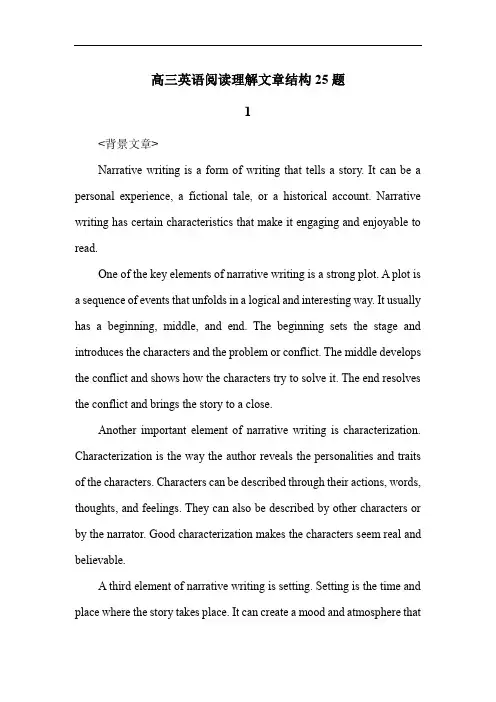
高三英语阅读理解文章结构25题1<背景文章>Narrative writing is a form of writing that tells a story. It can be a personal experience, a fictional tale, or a historical account. Narrative writing has certain characteristics that make it engaging and enjoyable to read.One of the key elements of narrative writing is a strong plot. A plot is a sequence of events that unfolds in a logical and interesting way. It usually has a beginning, middle, and end. The beginning sets the stage and introduces the characters and the problem or conflict. The middle develops the conflict and shows how the characters try to solve it. The end resolves the conflict and brings the story to a close.Another important element of narrative writing is characterization. Characterization is the way the author reveals the personalities and traits of the characters. Characters can be described through their actions, words, thoughts, and feelings. They can also be described by other characters or by the narrator. Good characterization makes the characters seem real and believable.A third element of narrative writing is setting. Setting is the time and place where the story takes place. It can create a mood and atmosphere thatenhances the story. Setting can also affect the actions and decisions of the characters.When reading narrative writing, it is important to pay attention to these elements. Look for the plot, characterization, and setting. Also, look for the theme or message of the story. The theme is the underlying idea or lesson that the author wants to convey.1. What is one of the key elements of narrative writing?A. Description.B. Plot.C. Argument.D. Comparison.答案:B。
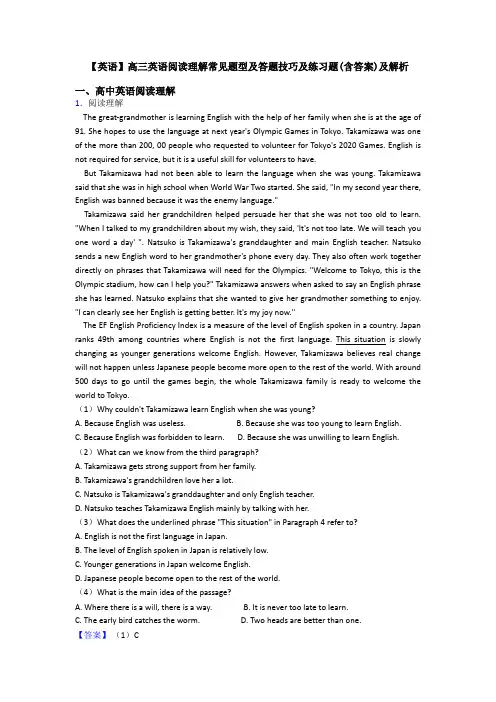
【英语】高三英语阅读理解常见题型及答题技巧及练习题(含答案)及解析一、高中英语阅读理解1.阅读理解The great-grandmother is learning English with the help of her family when she is at the age of 91. She hopes to use the language at next year's Olympic Games in Tokyo. Takamizawa was one of the more than 200, 00 people who requested to volunteer for Tokyo's 2020 Games. English is not required for service, but it is a useful skill for volunteers to have.But Takamizawa had not been able to learn the language when she was young. Takamizawa said that she was in high school when World War Two started. She said, "In my second year there, English was banned because it was the enemy language."Takamizawa said her grandchildren helped persuade her that she was not too old to learn. "When I talked to my grandchildren about my wish, they said, 'It's not too late. We will teach you one word a day' ". Natsuko is Takamizawa's granddaughter and main English teacher. Natsuko sends a new English word to her grandmother's phone every day. They also often work together directly on phrases that Takamizawa will need for the Olympics. "Welcome to Tokyo, this is the Olympic stadium, how can I help you?" Takamizawa answers when asked to say an English phrase she has learned. Natsuko explains that she wanted to give her grandmother something to enjoy. "I can clearly see her English is getting better. It's my joy now."The EF English Proficiency Index is a measure of the level of English spoken in a country. Japan ranks 49th among countries where English is not the first language. This situation is slowly changing as younger generations welcome English. However, Takamizawa believes real change will not happen unless Japanese people become more open to the rest of the world. With around 500 days to go until the games begin, the whole Takamizawa family is ready to welcome the world to Tokyo.(1)Why couldn't Takamizawa learn English when she was young?A. Because English was useless.B. Because she was too young to learn English.C. Because English was forbidden to learn.D. Because she was unwilling to learn English.(2)What can we know from the third paragraph?A. Takamizawa gets strong support from her family.B. Takamizawa's grandchildren love her a lot.C. Natsuko is Takamizawa's granddaughter and only English teacher.D. Natsuko teaches Takamizawa English mainly by talking with her.(3)What does the underlined phrase "This situation" in Paragraph 4 refer to?A. English is not the first language in Japan.B. The level of English spoken in Japan is relatively low.C. Younger generations in Japan welcome English.D. Japanese people become open to the rest of the world.(4)What is the main idea of the passage?A. Where there is a will, there is a way.B. It is never too late to learn.C. The early bird catches the worm.D. Two heads are better than one.【答案】(1)C(2)A(3)B(4)B【解析】【分析】本文是一篇记叙文,日本91岁的奶奶Takamizawa为了做好迎接在东京举行的2020奥运会的志愿工作,在孙辈的鼓励和帮助下开始学习英语。
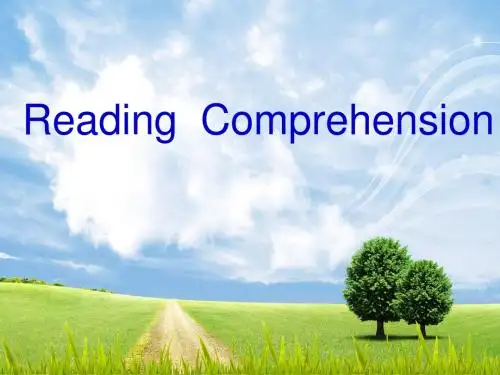
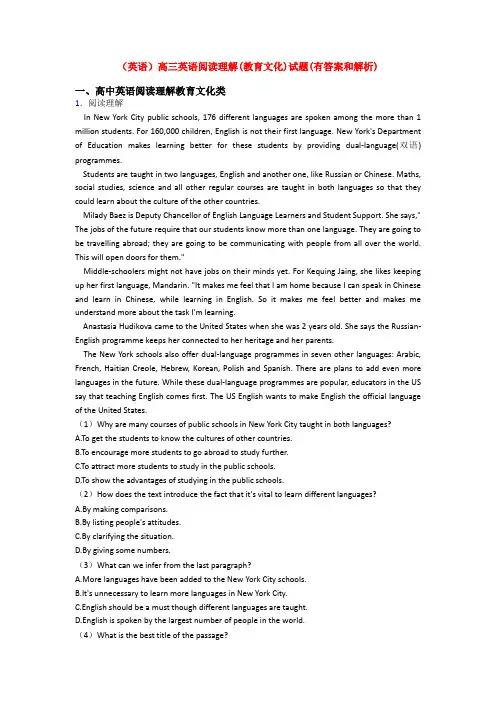
(英语)高三英语阅读理解(教育文化)试题(有答案和解析)一、高中英语阅读理解教育文化类1.阅读理解In New York City public schools, 176 different languages are spoken among the more than 1 million students. For 160,000 children, English is not their first language. New York's Department of Education makes learning better for these students by providing dual-language(双语) programmes.Students are taught in two languages, English and another one, like Russian or Chinese. Maths, social studies, science and all other regular courses are taught in both languages so that they could learn about the culture of the other countries.Milady Baez is Deputy Chancellor of English Language Learners and Student Support. She says," The jobs of the future require that our students know more than one language. They are going to be travelling abroad; they are going to be communicating with people from all over the world. This will open doors for them."Middle-schoolers might not have jobs on their minds yet. For Kequing Jaing, she likes keeping up her first language, Mandarin. "It makes me feel that I am home because I can speak in Chinese and learn in Chinese, while learning in English. So it makes me feel better and makes me understand more about the task I'm learning.Anastasia Hudikova came to the United States when she was 2 years old. She says the Russian-English programme keeps her connected to her heritage and her parents.The New York schools also offer dual-language programmes in seven other languages: Arabic, French, Haitian Creole, Hebrew, Korean, Polish and Spanish. There are plans to add even more languages in the future. While these dual-language programmes are popular, educators in the US say that teaching English comes first. The US English wants to make English the official language of the United States.(1)Why are many courses of public schools in New York City taught in both languages?A.To get the students to know the cultures of other countries.B.To encourage more students to go abroad to study further.C.To attract more students to study in the public schools.D.To show the advantages of studying in the public schools.(2)How does the text introduce the fact that it's vital to learn different languages?A.By making comparisons.B.By listing people's attitudes.C.By clarifying the situation.D.By giving some numbers.(3)What can we infer from the last paragraph?A.More languages have been added to the New York City schools.B.It's unnecessary to learn more languages in New York City.C.English should be a must though different languages are taught.D.English is spoken by the largest number of people in the world.(4)What is the best title of the passage?A.English, out of date?B.The newest fashion in New York CityC.The education in New York CityD.Dual-language, to be or not?【答案】(1)A(2)B(3)C(4)D【解析】【分析】本文是一篇说明文,介绍了纽约的公立学校在重视英语教学的同时,还强调双语教学的必要性。
2024北京高三二模英语汇编阅读理解D篇(2024北京顺义高三二模)For decades,scientists thought of the brain as the most closely guarded organ.Locked safely behind a biological barrier,away from the disorder of the rest of the body,it was broadly free of destruction of germs (病菌)and the battles started by the immune system.Then,20-odd years ago,some researchers began to ask a question:is the brain really so separate?The answer, according to a growing body of evidence,is no—and has important effects on both science and health care.The list of brain conditions that have been associated with changes elsewhere in the body is long and growing. Changes in the make-up of the microorganisms resident in the gut(肠道),for example,have been linked to disorders like Parkinson’s disease.Some researchers think that certain infections could provoke Alzheimer’s disease and some could lead to emotional disorder in babies.The effect is two-way.There is a lengthening list of symptoms(症状)not typically viewed as disorders of the nervous system in which the brain and the neural processes that connect it to the body play a large part.For example,the development of a fever is influenced by a population of neurons(神经元)that control body temperature and appetite.The effect of brain on body is underlined by the finding that stimulating a particular brain region in mice can‘remind’the body of previous inflammation(炎症)—and reproduce them.These findings and others mark a complete shift in our view of the interconnectedness of brain and body,and could help us both understand and treat illness.If some brain conditions start outside the brain,then perhaps cures for them could also reach in from outside.Treatments that take effect through the digestive system,heart or other organs,for instance, would be much easier and less striking to give than those that must cross the blood-brain barrier,the brain’s first line of defence.In the opposite direction,the effects of our emotions or mood on our capacity to recover from illness could also be used.There is an opening work under way testing whether stimulating certain areas of the brain that respond to reward and produce feelings of positivity could enhance recovery from conditions such as heart attacks.Perhaps even more exciting is the possibility that making changes to our behaviour—to reduce stress,say—could have similar benefits.For neuroscientists,it’s time to look beyond the brain.And clinicians treating the body mustn’t assume the brain is above getting involved—its activity could be influencing a wide range of conditions,from mild infections to long-time fatness.1.The author writes paragraph1mainly to______.A.evaluate an argument B.present an assumptionC.summarize the structure D.provide the background2.What does the underlined word“provoke”mean in Paragraph3?A.Delay.B.Cure.C.Cause.D.Disturb.3.What can we learn from the passage?A.Treatments that cross brain-blood barrier are less used.B.Previous diseases could cause the production of new ones.C.Emotions could affect the capacity to fight against diseases.D.Treatment of the brain takes priority over other treatments.4.Which of the following shows the development of ideas in the passage?I:Introduction P:Point Sp:Sub-point(次要点)C:ConclusionA.B.C.D.(2024北京丰台高三二模)A shopkeeper’s son breaks a window,causing a crowd to gather.They tell the shopkeeper not to be angry:actually,the broken window is a reason to celebrate,since it will create work for the glazier(装玻璃的工人).In the story,written by a19th-century economist,the crowd envisions the work involved in repairing the window,but not that involved in everything else on which the shopkeeper could have spent his money—unseen possibilities that would have brought him greater happiness.If that window were to be broken these days,people might have a different reaction,especially if they were NIMBYs (Not In My Back Yard)who oppose any local construction that affects their quality of life.Their concern might be with the “embodied carbon”.The production of a piece of glass would carry a sizeable carbon cost.Similarly,the bricks and concrete in a building are relics of past emissions.They are,the logic goes,embodied carbon.Conserving what already exists,rather than adding to the building stock,will avoid increasing these embodied emissions—or so NIMBYs often suggest.At its worst,this idea is based on a warped logic.Greenhouse gases released by the construction of an existing building will heat the planet whether the building is repaired or knocked down.The emissions have been taken out of the world’s“carbon budget”,so treating them as anew debit means double counting.The right question to ask is whether it is worth using the remaining carbon budget to repair a building or it is better to knock it down.Choosing between these possibilities requires thinking about the unseen.It used to be said that construction emitted two types of emissions.Besides the embodied sort,there were operational ones from cooling,heating and providing electricity to residents.Around the world,buildings account for39%of annual emissions,according to the World Green Building Council,of which28%come from operational carbon.These two types of emissions might be enough for the architects designing an individual building.But when it comes to broader questions,economists ought also to consider how the placement of buildings affects the manner in which people work,shop and travel.Density(密度)lowers the per-person cost of public transport,and this reduces car use.Research by Green Alliance,a pressure group,suggests that in Britain a policy of“demolish(拆除)and densify”—replacing semi-detached housing near public transport with blocks of flats—would save substantial emissions.Without such demolition,potential residents would have to move to the suburbs instead,saving money on rent but consuming more energy.Targeted subsidies(补贴),especially for research and development into construction materials,could speed up the pace at which the built environment decarbonises.What will never work,however,is allowing the loudest voices to decide how to use land and ignoring the carbon emissions of their would-be neighbours once they are out of sight.5.The first two paragraphs are written to________.A.exemplify an outlook on energy conservation B.present a new way of relieving energy crisisC.explain people’s reaction to a broken window D.introduce an argument on carbon emission6.What does the underlined word“warped”in Paragraph3probably mean?A.Unsound.B.Complicated.C.Distinctive.D.Underlying.7.What can be learnt from the passage?A.Operational carbon accounts for a larger share of carbon emission.B.Repairing old buildings outweighs demolition in energy conservation.C.Higher residential density near public transport may help reduce emission.D.Stopping residents from living in new buildings is sensible to energy saving.8.As for decarbonization of the built environment,which would the author agree with?A.Interests of NIMBYs are worthy of consideration.B.A comprehensive insight into emission is essential.C.Upgrading construction materials should be prioritized.D.Every resident should do their bit in reducing carbon emission.(2024北京昌平高三二模)In1992,Edward de Bono argued that“creativity is the most important human resource of all.”But might computers have the capacity to be creative?Could artificial intelligence outperform us in even the most human of phenomena?These questions have moved to the forefront of society with the launch of ChatGPT and DALL-E, two powerful deep learning models capable of creating art.Where human creativity comes from is a complex and heavily-debated topic.One theory supposes that creativity emerges from solving problems in new ways.The game designer Mark Rosewater explains that“if you use the same neural pathways,you get to the same answers,and with creativity,that’s not your goal.”But studies from the University of Virginia suggest humans most default(默认)to solving problems by building on known solutions,restricting originality. Some neuroscientists propose another theory regarding creativity.Research from the University of Calgary reveals that when being creative,humans don’t use the same brain regions associated with thought and problem-solving,implying that creativity is primarily an unconscious process.According to this theory,the brain solves problems best when not directly focusing on them using the frontal lobe(前额叶),instead letting the other parts of the brain take over.A.I.cannot currently emulate(仿真)the full complexity of the human mind.Do these deep learning networks even have the required components that we use when we are creative?Douglas Hofstadter explains how“emergent phenomena,”such as creativity,correspond to connections between levels within mental systems.Similar connections could exist in artificial neural networks,even if the mechanics differ.For example,modern artificial intelligence employs attention circuits that may cause it to behave similarly to the frontal lobe where most of the brain’s focusing tendencies come from.The emergent nature of creativity opens the door for similar tendencies in machines,but they are tuned so carefully to copy existing ideas that it may not be enough for true originality.Mr.Rosewater’s theory on creativity suggests that for A.I. to be creative,it should be able to solve problems in new ways,which is difficult because A.I.is based so heavily on already existing ideas.Alternatively,if creativity is an unconscious process as the University of Calgary research suggests, then it occurs mostly outside the frontal lobe and may not exist in machine learning networks.Either way,current A.I. probably lacks the capacity for genuine creativity and originality,but it can combine existing ideas in interesting ways.The question of machine creativity has repercussions in many areas,such as developing copyright law regarding A.I. works,considering A.I.submissions in art contests,and determining the use of ChatGPT as a tool for school assignments. Creativity may be,at least for now,a unique human puters are not yet starting revolutionary artistic movements,but they are already combining what exists into something new,challenging us to look deeper into our own creativity.9.About the source of human creativity,research from the University of Calgary discovers that______.A.human creativity heavily relies on the existing ideasB.dealing with problems helps develop human creativityC.being creative is closely related to certain brain regionsD.human creativity is a process that happens automatically10.The author would probably agree that______.A.efforts should be put into the study of human creativityB.creativity can be attained consciously on most occasionsC.A.I.creates better than humans in some areas at presentD.humans need machines to be more creative in various areas11.What does the underlined word“repercussions”in Paragraph5probably mean?A.Influences.B.Objections.C.Doubts.D.Causes.12.Which would be the best title for the passage?puting Creativity:Is it a good thing?puting Creativity:Can it be possible?C.Human Creativity:Why does human develop it?D.Human Creativity:How can A.I.help human create?(2024北京朝阳高三二模)It is perhaps easy to accept the statement that the universe is expanding.It is just some strange physics indicating that,as time goes on,galaxies(星系)get further away from each other just like two cars racing away from each other.I personally don’t like it and prefer the balloon analogy.In this situation,there are dots all over a balloon.When we blow it up in real life,the dots would increase in size.In this analogy,let’s assume they don’t.What we are interested in is how the distance between the dots on the surface of the balloon grows as we put more air into it.The balloon analogy relies somewhat on our geometric sensibilities which refer to our sense of shapes and how they change over time.At its core,what we are trying to develop a sense for is how we measure distances.This concept is also the fundamental goal of general relativity,Einstein’s theory of gravity.In general relativity,the most important piece of information is what we call the metric,an equation that describes how distances are measured,and therefore also tells us about the shape space-time is taking.The whole idea that space-time is expanding was first noticed as a mathematical consequence of general relativity by Georges Lemaitre in1927,when he solved Einstein’s equation and found a solution for the metric showing that distances grow with time.His work provided a theoretical explanation:the standard for measuring cosmic(宇宙的)distance was itself changing with time.What is delightful is that it means we can quite reasonably say that universe’s expansion is a gravitational effect.I enjoy this because it is so deeply counterintuitive to our usual understanding of gravity,which teaches us that it is a force that always draws things together.But in this case where gravity is a geometric effect,we are offered a broader range of gravitational possibilities.It is worth noting that the geometric explanation of general relativity hasn’t been universally popular.The late physicist Steven Weinberg wrote that the geometric explanation of the theory of gravitation has been reduced to a mere analogy,but is otherwise not very useful.Another challenge with the balloon analogy and our reliance on geometric explanation is to explain why gravity seems to pull things together in many situations,while universe is expanding.This difference is resolved by acknowledging that local gravitational effects due to massive objects dominate over large-scale expansion effects,leading to the formation of structures like stars,galaxies and,eventually us.In fact,the analogy where universe is only expanding and this is the only gravitational effect at play is a very idealized situation where matter was initially spread out perfectly evenly across the universe.13.The author presents the balloon analogy in Paragraph2mainly to_________.A.introduce a topicB.draw a comparisonC.confirm a theoryD.evaluate a statement14.What does the underlined word“counterintuitive”in Paragraph5probably mean?A.Unchallenging.B.Contradictory.C.Satisfying.D.Relevant.15What can be inferred from the passage?A.Universe’s expansion results in the creation of structures like galaxies.B.Lemaitre’s work suggests the standard for cosmic distance is consistent.C.A uniform distribution of matter can overcome the universe’s expansion.D.The metric is key to sensing the shape of space-time in general relativity.16.Which would be the best title for the passage?A.Studying Galaxies—Has the Balloon Analogy Been Outdated?B.Rethinking Gravity—Is it a Way to Make Sense of the Balloon Analogy?C.Arguing against the Car Analogy—Does the Balloon Analogy Win Over?D.Understanding Universe Expansion—Is the Balloon Analogy Acceptable?(2024北京东城高三二模)You might not think that an AI capable of making music would stimulate your emotion, but others think differently,particularly those who gathered at Mexico City’s Symphony Hall in2019for Schubert’s Unfinished Symphony,which I finished using melodies generated by an AI.As the orchestra(管弦乐团)finished Schubert’s original work and began the music the AI and I had written,I could feel the crowd’s energy shift from astonishment to indignation and fear.They seemed afraid that an AI might be able to make emotional symphonic music.You can see their point:an AI that makes emotional music could affect the emotional lives of thousands or even millions of people in a small,but profound way,just like a human musician does.Positive and negative,people reacted very strongly to AI’s symphonic debut(首秀).Even though most people don’t believe that AI can create something enjoyable,they,at least partly,did enjoy the Unfinished Symphony.Enjoyment in music implies that there’s something in the music that the listener connects to,a perception of shared emotion.But,in the case of AI music,an emotion shared with who?AI,as of yet,has no emotions.So what is the meaning of music made without an emotional composer?The unsatisfying answer is that music has no objective meaning.A composer can decide how a piece of music sounds,but it’s the listener that decides what it means.No matter how it s created,music doesn’t exist in a vacuum(真空)to the listener.The meaning we assign to music depends on its context—how the piece connects to other elements in our lives.Without context,music is like the results of a game whose rules have been lost.The context for a music is part of who you are.The music is emotional to you because you have the context to appreciate it.As it continues to evolve,AI music will develop its own context.Certainly,it’ll be different from human-made music.It’ll mix existing genres to create new ones;it’ll combine instruments that we wouldn’t think of combining.Its rules will be different.I’m now always asked the same“Who put the emotion in that music:you,the composer,or the AI?”But that’s not the question they really want to ask,though.There’s a deeper question that most people are too afraid to ask right now:“Are my emotions so simple that they can be maneuvered by a machine?”In my experience,this could be possible one day.If a modestly capable music AI in2019could stir up emotions of an audience,maybe AI can have a more powerful effect on our emotional lives than we’d like to admit.17.The audience reacted strongly to the symphony mainly due to______.A.their doubts about AI’s capabilitiesB.their uneasiness about AI’s influenceC.the orchestra’s brilliant presentation of AI musicD.the likeness between AI music and the original work18.What might the author agree with?A.AI poses little impact on people’s emotions.B.Music bears no intended emotional meaning.C.AI music will outperform human-made music.D.The context reflects people’s interpretation of music.19.What does the word“maneuvered”underlined in Paragraph6most probably mean?A.Refreshed.B.Challenged.C.Revealed.D.Directed.20.Which would be the best title for the passage?A.Are Composers To Be Replaced?B.Would AI Music Be a Rising Trend?C.Could AI Make Music That Moves You?D.Was the Unfinished Symphony Successful?(2024北京海淀高三二模)We are a social animal.Indeed,it is our sociality—such as the ability to make sense of each other,to communicate,to work cooperatively and,finally,to create culture—that marks us off from other animal species.But then why are we everywhere striving to increase our isolation and limit our contact with others?As musician David Byrne argues in an essay published last month,it is a striking fact about the new technologies that have so come to shape our lives,that they have precisely this effect:they limit our need for human contact.Online shopping?Check. Automated checkout?Check.Ride hail apps?Check.Efficiency is the key.We purchase efficiency by limiting the human aspect,known as“autonomous operation”.This is perhaps even more pronounced with new technologies on the horizon. Take the MOOC,the teacher-less virtual classroom.As Byrne notes,this is meant to deliver the values of a learning environment without,well,without the environment—you get to stay at home—no teacher,but also,no fellow students.Byrne isn’t claiming we are consciously choosing to isolate ourselves.We shop online because it is convenient.The absence of contact with others is a side-effect.Maybe even an unavoidable one,as one of the things that makes online shopping so easy is precisely the absence of contact with other people.But Bryne’s thought is that whatever our intention,the tendency of our tech to isolate us may be a feature,not a bug. His hypothesis is that we actually,at some level,crave(渴望)the increased isolation and we are actually making technologies to satisfy impulses that,in some way,go beyond—or against—our social nature.But I wonder,is this really new?Even if we are social by nature,and do everything we can to embed ourselves socially,the need to find ways to be alone is,well,nothing new.It’s also striking that the very activities that risk separating us—in the old days,books, newspapers,TV;nowadays,the latest apps—also connect us.We read about each other.What we read gives us information to share with each other.I am well aware of the data that shows the more time you spend on social media,the sadder and more isolated and envious you feel of others.But how novel is the isolating effect of social media?Being there reminds me a lot of what it was like to be social in high school—you have a vivid sense of your status and your standing in relation to others,and you have to deal with that.This may be isolating,sure.But it’s the isolating face of the social lives we’ve always had.It is isolating because of the ways technology brings us into real contact with others,not because it removes that contact.I wonder whether more isolation is a real option,after all.21.Which of the following best reflects“autonomous operation”?A.Getting a toothbrush via a hotel delivery robot.B.Teaching mom how to establish a smart home.C.Seeking help by calling human customer services.D.Having an online meeting at home with colleagues.22.Which of the following might the author agree?A.Technology offers fresh insights into our social status.B.Actions seemingly isolating can bond people.C.Social platforms help bring people closer.D.Social media has come to define our life.23.What would be the best title for the passage?A.What Technologies Do to Human NatureB.Do Technologies Shape Our Lives?C.How Isolation Changes with ConnectionD.Can We Erase Human Element?(2024北京西城高三二模)Can you imagine getting a major dental procedure without novocaine(一种麻醉药)?A scientist colleague of mine recently told me,rather than use it,he used a“focus in”meditation(冥想)technique to direct all of his attention to his mouth with as much calming equanimity as he could gather.Doing so transformed the pain for a few minutes.A stream of scientific articles suggests that there are benefits in turning toward discomfort or negative emotions with acceptance.In addition,all of us can gain from finding ways to cope with stress and suffering—particularly when larger circumstances are beyond our control.As a researcher who has studied meditation for more than20years,I believe that the cultivation of equanimity can help.It’s important to first define the idea of turning toward discomfort.I’m not advocating for people to put themselves in dangerous positions.But when we push ourselves into challenging or embarrassing situations,much like trainers who push athletes just past their comfort zone to make gains,learning often happens.My own research indicates that meditation provides an ideal way to practice turning toward discomfort—particularly when it trains up one’s equanimity.In my laboratory at Carnegie Mellon University,we conducted several clinical trials on developing equanimity during mindfulness meditation training.This approach includes guided meditation exercises such as using a matter-of-fact voice to label uncomfortable feelings in the body or welcoming uncomfortable feelings by saying “yes”aloud each time a feeling is detected.We hired153stressed adults and offered them a mindfulness meditation training program with or without training in equanimity.Our equanimity skills training group had significantly better outcomes on several measures.After just14days of training,for example,the participants who learned equanimity skills had significantly lower biological stress responses when asked to deliver a difficult speech and solve math problems in front of experts in white lab coats.This group also had significantly lower blood pressure and stress levels.In the days after training,people introduced to equanimity exercises also reported significantly higher positive emotions and well-being throughout the day and more meaningful social interactions than participants who received mindfulness training without the equanimity component.It was as though developing equanimity had their emotional reactivity to stress,helping them better appreciate and enjoy daily life’s many little positive and making them more curious and open to connecting with others.We are expanding on this work in several ways—including through the development of an app that offers equanimity training on demand and with trials involving participants with stress-related gastrointestinal(胃肠的)disorders.Meanwhile other scientists are further exploring equanimity’s power.We are convinced we can each build our resilience(恢复力)on a personal level by cultivating greater acceptance of our experience—good or bad,painful or pleasant—in the present moment.24.What can be learned about equanimity?A.It is a state of mental calmness.B.It is a form of negative emotions.C.It is a replacement for novocaine.D.It is the result of mindfulness meditation.25.Which of the following is a good example of equanimity training?A.Ignoring discomfort totally.B.Detecting unusual behavior.C.Keeping emotions to oneself.D.Seeing negative feelings objectively.26.Paragraph5is written to show______.A.the benefits of developing equanimityB.the procedure of mindfulness meditationC.the performances of two meditation training groupsD.the relationship between equanimity and well-being27.What can be inferred from the last paragraph?A.Stress contributes to physical disorders.B.Pleasant experiences result in greater equanimity.C.People are likely to have easy access to equanimity training.D.Resilience can help people gain more acceptance of hardship.参考答案1.D2.C3.C4.A【导语】本文为一篇说明文,说明了大脑并不是独立存在的,它对科学和医疗保健都有重要影响。
⾼考英语阅读理解模拟练习及答案⾼考英语阅读理解模拟练习及答案 多做英语阅读理解模拟题可帮助⼤家熟悉解题⽅法,为了帮助⼤家,⼩编分享了⼀些⾼考英语阅读理解题及答案,欢迎阅读! 英语阅读理解(1) Have you ever wondered why you sometimes take an almost immediate liking to a person you have just met? We often get the first impression of a people based on the color of a person’s skin or the manner in which he or she dressed. Meaning is conveyed not only by words or verbal languages but also by nonverbal communication systems, such as body behaviors. Nonverbal communication is important because we use the actions of others to learn about their affective emotional states .Our emotions are reflected in our posture, face, and eyes—be it fear, joy, anger, or sadness—so we can express them without ever saying a word .For this reason, most of us rely heavily on what we learn through our eyes. Nonverbal communication is significant in human interaction because it is usually responsible for the first impressions. More importantly, those first messages usually influence the perception(感知) of everything else that follows. Even how we select friends and sexual partners is grounded in first impressions with nonverbal communication. Nonverbal communication is important because it is culture-related. It is based on different beliefs, religions, values and customs in different cultures. When, where, how, and to whom people display his or her specific nonverbal behaviors is greatly affected by culture and context. Culture determines what the appropriate nonverbal behavior is. For example, feelings of friendship exist everywhere but their expression varies. It may be appropriate in some countries for man to embrace each other and for women to hold hands; in other countries these displays of affection may be shocking. Each culture has its own specific interpretation on nonverbal communication. What is acceptable in one culture may be completely unacceptable in another. One culture may determine that snapping fingers to call a waiter is acceptable; another may consider this gesture rude. 1. What is the best title of the passage? A. Nonverbal communication and first impression B. Nonverbal communication is culture-related C. Nonverbal and verbal communication D. The importance of nonverbal communication 2. We can know a person’s feeling through our eyes because_________. A. we can see a person’s feeling on his face. B. a person’s emotions can be reflected through eyes. C. a person’s feeling can be reflected through his body languages D. we can see a person’s feeling through his posture 3. Which of the following statements is not True? A. Meaning can be conveyed both by words and body language. B. We can use nonverbal communication to learn about a person’s emotional states. C. We often get the first impression by what a person says. D. The first impression can affect what we will do in the following. 4. How many reasons are mentioned in the text to show nonverbal communication is important?A. 2B. 3C. 4D.5 5. What can we conclude from the last paragraph? A. we can use different ways to express friendship B. each culture has its own specific interpretation on nonverbal communication C. snapping fingers to call a waiter is acceptable D. learning a country’s culture is very important. 【答案解析】 1. D 根据第⼆、三、四段的⾸句可知本⽂所讲述的主要内容。
高考英语《阅读理解+完形填空》真题含答案Ⅰ.阅读理解A“You're so smart!”This encouraging response to children's math performance is commonly heard. Recently, a new study, conducted by the University of Georgia, found that encouraging children with responses related to their personal characteristics or inborn abilities might weaken their math motivation and achievement over time.Parents who make comments linking their children's performance to personal characteristics like intelligence are using what's referred to as person responses. In contrast, parents who link their children's actions, such as efforts or strategy use, to their performance are using process responses.For the study, researchers asked more than 500 parents to report on how they responded to their children's math performance and their math beliefs and goals. Children were assessed in two waves across a year to measure their math motivation and achievement.The results show that parents who view math ability as changeable are more likely to give process responses focused on their children's strategy use and efforts rather than their intelligence or other personal characteristics. In contrast, parents who believe math ability is unchangeable and that math failure can't be constructive give more person responses. Parents with high expectations for their children give a combination of both responses. While responses highlighting strategy and efforts are not related to any achievement outcomes, children who receive more responses about their personal characteristics—in particular, related to failure—are more likely to avoid harder math problems, exhibit higher levels of math anxiety, and score lower on math achievement tests.Because person responses predict poor math adjustment in children over time, researchers suggest parents limit this type of responses at home. Another recommendation for parents is to think about their own beliefs and goals for their kids and examine how these might lead them to respond in person or process ways. Simply telling parents to avoid talking about math ability may not be enough. Focusing less on how children perform and more on their strategy and enjoyment of math might be a more effective way to enhance motivation.【语篇解读】本文主要讲述了一项新的研究发现,用孩子们的个人特征或天生能力鼓励他们,可能会随着时间的推移削弱他们的数学动机和成就。
高三英语阅读理解练习AMany Chinese kids,known as “left-behind”children,hardly ever see their parents,because their parents are migrant workers.Li Ling,11,is a left-behind child.Her parents have been working in Zhejiang for 10 years,while she lives with her grandparents in Guangdong.She was reunited with her parents last Spring Festival.As the number of migrant workers in China increases,the number of left-behind children is rising fast.Li is one of the 61.02 million left-behind children under 17.They account for 37.7 percent of rural children and 21.88 percent of all Chinese children.“The large number of left-behind children has already become a social issue.If left unsolved,it will cause serious problems,”Wang Zhenyao,director of the China Philanthropy Research Institute,told China Daily.The education level of adults supervising (监督) these children is generally not that high.They can only take care of the children’s personal safety and daily living,being unable to care for their educational and spiritual needs.Meanwhile,the absence of parental support will make some left-behind children lack self-confidence.They may be slower in physical and emotional growth than their peers.Others may even become “problem youths”.To solve this problem,the government is taking action.For instance,30 provinces and cities have allowed certain children to attend school and take the college entrance exam in the city where their parents are.However,Wang suggested that the country do more,such as making policies encouraging migrant workers to work in their hometowns.He also said that a well-balanced child welfare system is needed.“These children are the future of the nation,so they deserve our loving care and protection,” Wang said.语篇解读随着进城务工人员数量的增加,留守儿童的数量也迅速上升。
二、观点态度题(2019·北京,C)The problem of robocalls has gotten so bad that many people now refuse to pick up calls from numbers they don’t know.By next year,half of the calls we receive will be scams(欺诈).We are finally waking up to the severity of the problem by supporting and developing a group of tools,apps and approaches intended to prevent scammers from getting through.Unfortunately,it’s too little,too late.By the time these “solutions”(解决方案)become widely available,scammers will have moved onto cleverer means.In the near future,it’s not just going to be the number you see on your screen that will be in doubt.Soon you will also question whether the voice you’re hearing is actually real.That’s because there are a number of powerful voice manipulation(处理) and automation technologies that are about to become widely available for anyone to use.At this year’s I/O Conference,a company showed a new voice technology able to produce such a convincing human-sounding voice that it was able to speak to a receptionist and book a reservation without detection.These developments are likely to make our current problems with robocalls much worse.The reason that robocalls are a headache has less to do with amount than precision.A decade of data breaches(数据侵入) of personal information has led to a situation where scammers can easily learn your mother’s name,and far more.Armed with this knowledge,they’re able to carry out individually targeted campaigns to cheat people.This means,for example,that a scammer could call you from what looks to be a familiar number and talk to you using a voice that sounds exactly like your bank teller’s,tricking you into “confirming” your address,mother’s name,and card number.Scammers follow money,so companies will be the worst hit.A lot of business is still done over the phone,and much of it is based on trust and existing relationships.V oice manipulation technologies may weaken that gradually.We need to deal with the insecure nature of our telecom networks.Phone carriers and consumers need to work together to find ways of determining and communicating what is real.That might mean either developing a uniform way to mark videos and images,showing when and who they were made by,or abandoning phone calls altogether and moving towards data-based communications—using apps like FaceTime or WhatsApp,which can be tied to your identity.Credibility is hard to earn but easy to lose,and the problem is only going to get harder from语篇解读随着科技的发展,诈骗手段越来越多样,骚扰电话给人们带来了危害。
高三英语阅读理解专项训练100(附答案)及解析一、高中英语阅读理解1.阅读理解Amazing concept images have shown what homes of the future could look like, as preparations are made for the world's first free from 3D-printed property (房产).Experts will build a house called Curve Appeal, which will be 3D-printed off-site before being put together on-site to create two outside walls,a roof and an inside part.These four main sections will then be joined together.Although3D-printed buildings have been made before,this home-to be constructed in Chattanooga, Tennessee, later this year— will be the first of its kind, as it will contain no regular shapes or angles. The house is the creation of the design company WATG, based in London and California. The design for Curve Appeal draws inspiration from the Case Study House program.The architects leading the program were famed for constantly pushing the limits in terms of minimalist(极简主义)materials,and trying to create open-plan spaces that focused on enhancing (增强) natural light.In a written statement, a spokesman for WATG said, “Employing many of the same modem design principles,Curve Appeal is the next evolutionary step.It's important that the architecture and the environment work together harmoniously. The chosen site is steps away from the Tennessee River in a beautiful wooded, sunlit area.”WATG was awarded the first prize in the Freeform Home Design Challenge in 2016 and given prize money of$8,000to make its plans a reality.The competition was aimed at architects, designers, engineers and artists. Participants were challenged to design a 600 to 800sq ft single-family home that rethinks traditional aesthetics(美学),ergonomics,construction,building systems and structure.Over the last year,WATG's Chicago office has been developing their design with Branch Technology. This project is currently underway, working towards breaking ground later this year. Once completed, the Curve Appeal home will have open and light-filled inside living spaces.(1)From the passage we can know that Curve Apple .A. will be different from an ordinary houseB. is the first 3D-printed buildingC. has apparent walls and a roofD. was ever built in the world(2)Where is the architect located according to Paragraph 4?A. Far away from the Tennessee River.B. In the woods near the Tennessee River.C. Between the Tennessee River and the woods.D. Next to some modem architectures.(3)What does the Freeform Home Design Challenge do?A. It motivates participants to design at random.B. It emphasizes traditions rather than modernization.C. It sponsors competitors when necessary.D. It helps put creative ideas into practice.(4)What's the passage mainly about?A. What our homes will look like in the future.B. The Freeform Home Design Challenge.C. The world's first freeform 3D-printed house.D. The development of 3D in architecture.【答案】(1)A(2)B(3)D(4)C【解析】【分析】本文是一篇说明文,介绍了世界上第一个免费的3D打印房子。
Shakespeare’s Birthplace and Exhibition Henley Street, Stratford-upon-Avon Tel:01789 204016 Shakespeare’s birthplace was the childhood home of William Shakespeare. Take a step back in time and see what life was like for the young Shakespeare growing up in the Stratford-upon-Avon. The house has been exactly furnished, and includes both original and copy items similar to those which would have been there in the house when Shakespeare was a boy. Beautiful painted cloths hang on the walls, brightly colored fabrics fill the rooms and his father’s glove workshop has been recreated. At the back of the house is a beautiful garden containing many plants, herbs and flowers mentioned in Shakespeare’s plays. The neighboring exhibition shows Shakespeare’s life and focuses on many rare local items connected with him, as well as a copy of the first edition of his collected plays published in 1623. ◎Limited disabled access ◎Many restaurants close to Shakespeare’s birthplace ◎Town center parking ◎Gift shops ◎Allow at least 45 minutes to visit the house and the exhibition
Adult £ 6.70 Child £ 2.60 Family £ 15.00 Summer Mid Winter
Jun.-Aug. April.–May Sep.-Oct. Nov.-Mar. Open Last Entry Open Last Entry Open Last Entry
Monday- Saturday 9 am 5:30 pm 10 am 5 pm 10 am 4 pm
Sunday 9:30 am 6 pm 10 am 5:30 pm 10:30 am 4 pm 21. How much would they pay if a couple with their two children visit the exhibition? A. £ 5.2 B. £ 13.4 C. £15. D. £ 18.6 22. What is the deadline to enter the exhibition on Friday in July? A. 4 pm B. 5 pm C. 5.30 pm D. 6 pm 23. What can we see in Shakespeare’s birthplace? A. Old furniture B. Ancient restaurants C. Colored gloves D. Shakespeare’s plays
B People need to seek out new foods because the world has so many mouths to feed. As of 2015, there are more than seven billion people on Earth, according to the United Nations. And by 2100 that number may double. Feeding all of these people means not only improving the way foods are grown, but also finding new sources of nutrition. And that quest is becoming ever more urgent. If nothing changes, within 35 years, the world’s appetite will be greater than the amount of foods produced. That’s according to a report released last year. It was prepared by the Global Harvest Initiative, a private agriculture group based in Washington, D.C. Global warming, too, is changing food production. Scientists predict that rising temperatures will reduce the growth of important crops like wheat, corn and soybeans. Low –income developing countries will be hit the hardest. When harvests fall, crops become more expensive. And since those foods are also used to feed animals like cows and pigs, meat prices, too, will rise. All over the world, researchers are racing against the clock to figure out how best to feed more people in a fast-changing world. And some surprising ideas have begun to come up. Two years ago, scientists introduced the first burger made from meat grown in a lab. The project cost more than $ 300,000, but it’s a start. Other researchers are developing seeds that can survive high temperatures and drought. Still others are finding ways to improve the genes of meat animals so they produce more meat and can stand the heat. A gloomy (悲观的) forecast for the planet isn’t the only reason to study foods for the future. It’s a creative quest that will inspire people who can think in new ways about existing plants and animals—even insects. These researchers have used their talents in ways that even they never would have predicted. 24. What do the underlined words ―that quest‖ in Paragraph 2 refer to? A. The research on foods. B. The increase of population. C. The variety of nutrition. D. The change of appetite. 25. How does global warming affect low-income developing countries? a. Increase meat prices. b. Raise the temperature. c. Reduce the growth of crops. d. Lead to the high cost of life. e. Cause a higher price for crops. A. b→a→c→d→e B. c→a→b→d→e C. d→e→c→a→b D. b→c→e→a→d 26. What is mainly talked about in Paragraph4? A. New ways of farming. B. Some great researchers. C. Progress in food research. D. Achievements in lab experiments. 27. What will be discussed in the following paragraph? A. Examples of successful food researchers. B. Different opinions about the future food. C. Methods of dealing with global warming. D. Possibilities of feeding the present population.